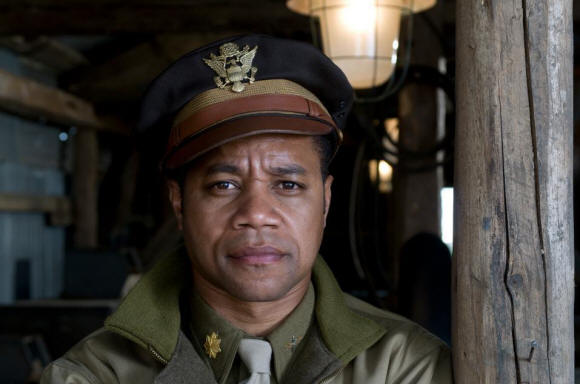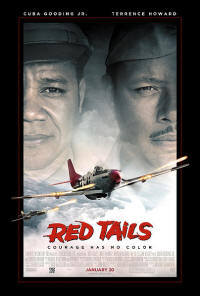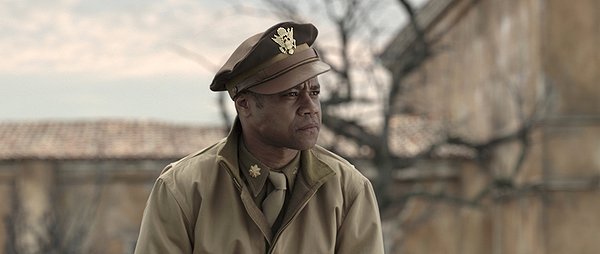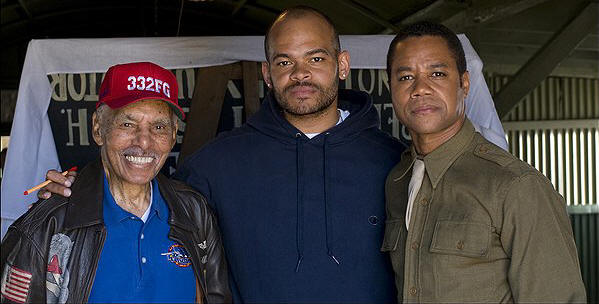Cuba Gooding Jr. - The "Red Tails" Interview [2012]
Oscar-Winner Opines on Playing Tuskegee Airman

Cuba Gooding, Jr. was born in the Bronx, New York on January 2, 1968, to Shirley and Cuba, Sr., the lead singer of the R&B group The Main Ingredient. After his deadbeat dad abandoned the family in 1974, Jr. and his siblings were raised in L.A. by his struggling single-mom. He ended up attending four different high schools, but was still popular enough to be voted class president at three of them.
Cuba’s showbiz career began in 1984 as a breakdancer during the closing
ceremonies of the Summer Olympics. He subsequently landed several bit roles
on TV and in movies before enjoying a meteoric rise after his spellbinding
performance as Tre in Boyz n the Hood.
In 1997, he won an Academy Award for his memorable outing as Rod "Show me
the money!" Tidwell in Jerry Maguire, and was named one of the 50 Most
Beautiful People in the World by People Magazine the same year. He has also
earned two NAACP Image Awards (for Radio and
Gifted Hands), a Screen Actors Guild Award (for Jerry Maguire), and he
even has his own star on the Hollywood Walk of Fame.
A born-again Christian since the age of 13, Cuba married his childhood
sweetheart, Sara Kapfer, whom he started dating in high school. They have
three kids, Spencer, Mason and Piper. Here, he talks about his latest outing
as Major Emanuelle Stance in Red Tails,
a World War II epoch about the legendary Tuskegee Airmen.
The Cuba Gooding, Jr. — The “Red Tails” Interview
with Kam Williams
 Kam
Williams: Hi Cuba, thanks for the interview.
Kam
Williams: Hi Cuba, thanks for the interview.
Cuba Gooding, Jr. (CG): Anytime, brother, how are you?
KW: Just fine. How’re things with you?
CG: I’m good. It’s easy when you’re talking about a movie you’re passionate
about.
KW: What made you so passionate about Red Tails?
CG: Well, I had first heard this story of the Tuskegee Airmen back in 1992
when I did that HBO movie. At the time, I was a young man just finishing his
education, and it frustrated me that I hadn’t learned anything about these
African-American pilots who had escorted bombers during World War II. It was
one of those things where I was going, "What the hell! Why didn’t I already
know this?" So, to tackle that subject-matter for HBO was monumental in my
life. Of course, I moved on in my career and did other things, but when I
heard that George Lucas was going to make a blockbuster about the Tuskegee
Airmen, I was all over it. How often do we in Hollywood get an opportunity
to tell a black tale on a scale like this, an action adventure? I knew it
was going to be visually stunning, so, I told him, “Hey, I have to be
involved even just to coach the actors or if l have to do Kraft Services.”
When I met with [director] Anthony Hemingway, we just connected. It was
the longest dinner, with tears and everything. He recognized that the
passion I had to be a part of the movie was the same passion that these men
had to do their part for their country. George even called and asked me to
narrate his new documentary for the History Channel called "Double Victory"
which chronicles both the Tuskegee Airmen’s triumphs in the skies over
Europe and the racism they had to deal with back in the States. So, it’s
been a fun ride, and I’ve been blessed to be involved in something that not
only I’m passionate about but so is the man financing it.
KW: Larry Greenberg points out that you’ve played pilots and
military men before, both real-life heroes like Carl Brashear in Men of
Honor and Dorie Miller in Pearl Harbor, and also fictional characters in A
Few Good Men, Judgement, Outbreak and other movies. He asks: Is this
something you have a passion for?
CG: I guess so. I used to say, "No, no, I just got lucky being cast." But
the older I get, the more I ask myself, "Cube, what’s your deal here?"
Truthfully, I think it’s playing real-life people that I’m attracted to. And
the majority of them have been military men. But there’s also James Robert
"Radio" Kennedy and some other guys I’ve played who are real-life people. I
think there’s something about the heightened responsibility to tell the
truth that attracts me to these roles, especially when you can have them on
the set to help you do your job. And now that I have two sons who are 15 and
17 who love watching movies, you can count me in whenever I have an
opportunity to do a movie that gives a history lesson about our
contributions, especially to the military. I’m in! I’m involved!

KW: Editor/legist Patricia Turnier asks: How would you describe your
character, Major Emanuelle Stance?
CG: Major Emanuelle Stance is the patriarch on the base. He’s like the
football coach. He’s the person that gives the men their encouragement
before they go back out onto the field.
KW: Teresa Emerson asks: What was it like to meet the surviving
Tuskegee Airmen? Did they help you prepare for your role as Major Stance?
CG: Every day, literally! They helped me to prepare to be a man. And not
only were they on the set every day, but one or two have attended each of
the screenings on the junket from Dallas to Miami. And they’re in their 90s!
It’s been a magical and emotional experience for me every, single time. So,
it’s been great! [Chuckles]
KW: Attorney Bernadette Beekman says: You’ve played a lot of heroes.
Who is your own personal hero?
CG: My mom, to do what she’s done to hold the family together. She raised
me, my brother, Omar, and my sister, with all of us being homeless and
having to live in the back of a car for a period of time. So, yeah, my mom’s
my hero. If I had to pick one from the screen, it might be U.S. Navy Master
Chief Carl Brashear.
KW: Film student Jamaal Green asks: Cuba, is there any material or
genre out there that you have not yet covered in your career that you would
like to try?
CG: Absolutely! I just heard about this magician named Black Herman who was
a contemporary of Houdini back in the early 20th Century. Also, I’m an avid
hockey fan and I’ve been playing for about 17 years, and somebody recently
told me that the first organized hockey teams in Canada were all black.
Telling those stories would be cool.
KW: Harriet Pakula Teweles asks: How do you expect the picture to
contribute to the public's rethinking of the historic role of the Tuskegee
airmen?
CG: I hope the picture makes an impact, and I know George Lucas is doing
everything he can to make sure that happens. And then there’s the
documentary Double Victory I mentioned which is serving as a tangent to the
movie. That will be more of a history lesson than Red Tails which is an
action adventure tale on the scale of Avatar, with 16,000 special effects.
It’s something that I think people are going to be really impressed with,
visually.
KW: Harriet also asks: What did you learn about yourself doing your
role in Red Tails?
CG: I learned that not only am I a descendant of slaves, but that I am also
a descendant of royalty, that there are politicians from the 1800s as well
as Tuskegee Airmen in my lineage.
KW: Rudy Lewis asks: How inspirational can Red Tails be to those who
who are not being educated in the skills necessary to compete nationally and
globally with young men of their generation? Will Red Tails be relevant to
those 50 percent of young black men who drop out of high school yearly?

CG: I hope so. If some youngsters are inspired to go back and complete their
education based on the achievements of these warriors, that would be God’s
gift.
KW: Patricia Turnier also says: One of my favorite roles you played
in your career is Dr. Ben Carson. What did it
mean to you to represent this great physician who became the first
African-American medical doctor in history to receive the Presidential Medal
of Freedom?
CG: [Shouts] You see! I forgot about that one while we were just focusing on
military men. It’s my passion to play all these types of characters that
help educate how great it is to be not just African-American, but American.
KW: The Columbus Short question:
Are you happy?
CG: Yes, sir. Every day.
KW: The Tasha Smith question: Are
you ever afraid?
CG: Yes, from time to time, but God has blessed me with the ability
to be more happy than fearful.
KW: When you look in the mirror, what do you see?
CG: Accomplishment. I’m 44. I made it. [Laughs]
KW: The Ling-Ju Yen question: What is your earliest childhood
memory?
CG: Watching it snow in the Bronx.
KW: If you could have one wish instantly granted, what would that be
for?
CG: Longevity.
KW: What is your favorite dish to cook?
CG: Top Ramen. [Laughs]
KW: The Sanaa Lathan question: What
excites you?
CG: Adrenaline.
KW: Thanks again for the time, Cuba, and best of luck with both Red
Tails and Double Victory.
CG: Nice talking with you, Kam.
Air Force Association Salutes the Tuskegee Airmen
Related Links
The Red Tails [2012] - Film Review
http://aalbc.com/reviews/red_tails.html
The Red Tails [2012] Interview with Ne-Yo
http://aalbc.com/reviews/ne_yo.html
Red Tails an AALBC.com
(Does the film deserve automatic support from the Black
Community?)
http://aalbc.com/tc/index.php?/topic/1147-the-new-film-red-tails-will-it-be-any-good-does-it-matter/
Daddy Day Camp
Interview with Cuba Gooding Jr.
http://reviews.aalbc.com/cuba_gooding_jr.htm
